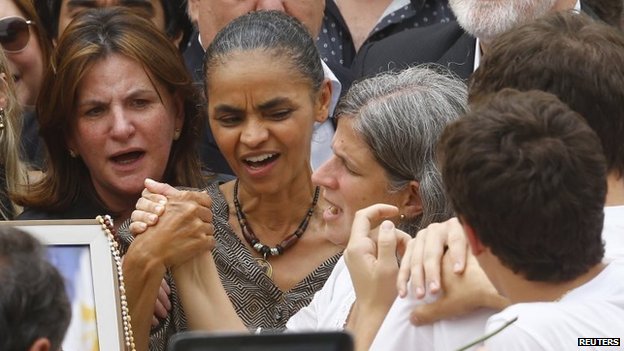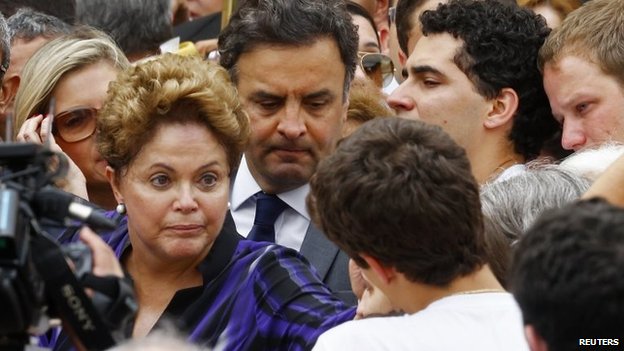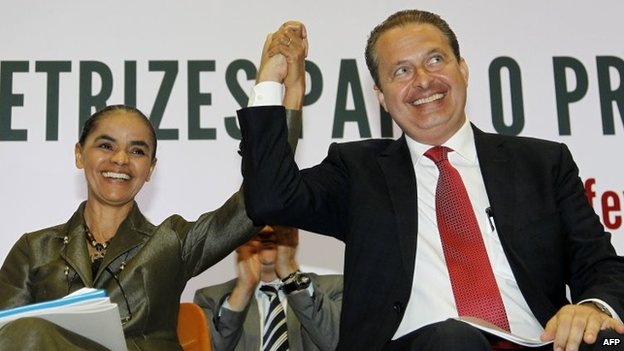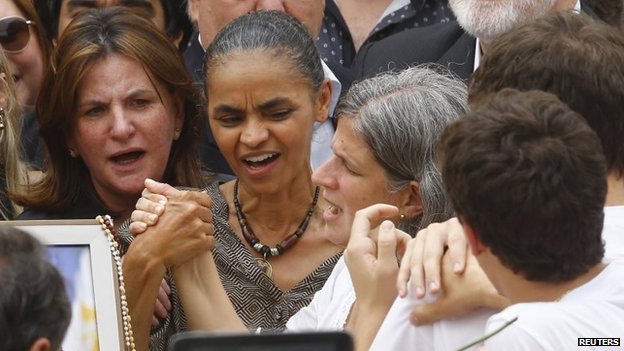It was hardly looking like a cliff-hanger.
Some accused it of being predictable and even boring - a presidential election in which the incumbent was all but guaranteed of being re-elected without, perhaps, even the need for a second round of voting.
But then tragedy intervened and changed everything.
We simply do not know what kind of president Eduardo Campos, the presidential candidate for Brazil’s Socialist Party who was killed in a plane crash last week, would have been.
With less than 10% of the projected vote, he certainly would not have been elected this time around, but many Brazilians and political observers had earmarked the 49-year-old former governor of the northern state of Pernambuco as a genuine contender for 2018.
Country in mourningAn estimated 100,000 mourners attended Mr Campos’ funeral in Recife at the weekend.

Among them was President Dilma Rousseff. It has been an impossible week for her.
Start Quote
This has been a terrible week for Brazil, one in which a young politician was lost before he could really make his mark on the national stage”
When Mr Campos’s plane crashed in Santos last Wednesday, killing him and six other people on board, Ms Rousseff lost a friend and former colleague.
And although the two were latterly political rivals, Mr Campos never really constituted a genuine threat to Ms Rousseff’s plans for re-election.
Indeed, despite his track record of being more business friendly and more ready to innovate than Ms Rousseff, one of the main criticisms of Mr Campos’ campaign in recent months was that he did not really go out of his way to differentiate himself from the president.
Furthermore, in what can be one of the most brutal and bitter professions on the planet, Mr Campos never really “went after” President Rousseff with the gusto and conviction of someone with an ideological drive to crush his opponent.
In Marina Silva, Mr Campos’s former running mate who is expected to be officially confirmed as his successor as presidential candidate later on Wednesday, Ms Rousseff has a formidable opponent.
Much-admired figureMs Silva will test President Rousseff’s status as favourite to win October’s election and make this a much more interesting process than it looked like being barely a week ago.
Supporting Mr Campos’ grieving family without hogging the limelight, saying enough without being seen to say too much, Ms Silva has handled herself well in the last few days.

Remember, she was meant to have been travelling on that small jet with Mr Campos. Had she not changed her travel plans, Brazil could now be mourning the loss of two, not just one, political stars of the future.
Polls conducted immediately after Mr Campos’s death suggested that while Ms Rousseff was still favourite to be re-elected, Marina Silva would push her hard if the race did go to a second round.
In the last presidential election, standing as the Green candidate, Ms Silva polled a credible 20% of the vote and is already a recognisable and much-admired figure across this continent-sized nation.
Brazil does not yet have the full, broad political spectrum of an arguably long-established and mature democracy.
Most of the “politics” revolves around the centre-left and left, a space occupied by both President Rousseff and Ms Silva.
‘Visibly shaken’Ms Rousseff’s Workers’ Party (PT) can boast about success in helping some 30 to 40 million Brazilians out of poverty through ambitious and comprehensively-structured social programmes.
 Ms Rousseff was visibly moved when meeting Mr Campos’s children at his funeral
Ms Rousseff was visibly moved when meeting Mr Campos’s children at his funeralThe president is also glowing in the wake of an overwhelmingly successful World Cup which defied the concerns of many sceptics at home and overseas.
Domestic and foreign investors, though, are getting worried as the economy slows and the incumbent shows little willingness to deregulate or loosen the reins on a highly protected and inefficient market.
Where Ms Silva threatens a visibly shaken President Rousseff is her appeal among those people, especially the young, who perhaps were disaffected with politics and were even disinclined to vote.
The thousands of mainly young people who protested in the streets of Brazil’s major cities against nepotism, corruption and social exclusion might find the daughter of illiterate rubber tappers more appealing than either President Rousseff or Aecio Neves.
Mr Neves, a senator from Minas Gerais, is the third of the three main presidential candidates and arguably the most business friendly of the three.
Other voters, including poorly paid state employees like teachers and transport workers, might feel drawn towards a woman with a squeaky clean image, known for her piety and honesty.
Political playerBut while Ms Silva does not come from a traditional political mould and was certainly not born into privilege, she is a political “player” who has been accused in the past of switching political allegiances for her own ends.

Known for her strong pro-environmental credentials, Ms Silva’s relationship with Mr Campos’ Brazilian Socialist Party (a term that should be applied loosely) will now come under close scrutiny if, as expected, it formally adopts her as its new presidential candidate.
After a three-day period of reflection and mourning for Mr Campos, President Rousseff looked shaky and flustered on her return to the campaign trail.
If, as is still expected, she is to be returned to office for a second term, she will need to up her game in the coming weeks.
She will have to show Brazilians worried about inflation, high prices and jobs that the economy will recover.
Against her better instincts, she might also have to show business leaders and foreign investors how she might slowly begin to open up a heavily protected economy.
But Ms Rousseff should, perhaps, not be too despondent. With more resources and, critically, more campaign advertising time than her main rivals, this is still her election to lose.
She is just going to have to work a little bit harder at it.
This has been a terrible week for Brazil, one in which a young politician, clearly loved in his native north-east, was lost before he could really make his mark on the national stage.
The focus now is on a slight, but deceptively tough former environmentalist - a mixed-race woman in a country where misogyny and racism have yet to be defeated.
Even if Ms Silva does not quite manage to achieve the impossible, after her unexpected elevation to become a presidential candidate, her impact on this election is eagerly anticipated.

Wyre Davies
Rio de Janeiro correspondent
How Brazil silenced its critics
05:19 UK time, Wednesday, 16 July 2014
Fears of mass civil unrest in Brazil during the World Cup turned out to unfounded, not least because of the government’s heavy-handedness, writes our Rio correspondent Wyre Davies.


